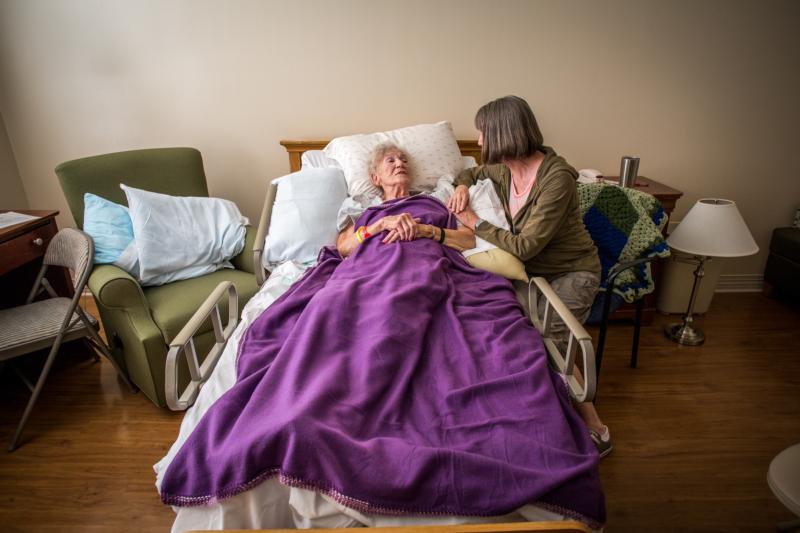
A woman sits at the bedside of her mother in 2016 at de Greeff Hospice house in St. Louis. St. John Paul II said in “Evangelium Vitae,” “Everyone has an obligation to be at the service of life.” (CNS photo/Lisa Johnston, St. Louis Review)
In October, the U.S. church will celebrate Respect Life Month, under the theme, “Christ Our Hope: In Every Season of Life.”
This theme recognizes that while the gift of life is under attack in every season — from conception through the end of life — it is always a blessing at each and every stage, and that Jesus Christ, as the source of our salvation and hope, gives us the strength to persevere in suffering and crisis.
This past year, the subject of abortion has been increasingly in the news. New York and Illinois passed expansive abortion rights laws, sweeping away restrictions on abortion and allowing abortions to take place into the third trimester.
[hotblock]
On the other hand, numerous states, including Georgia, Kentucky, Mississippi, Missouri and Ohio, passed laws prohibiting abortions after a fetal heartbeat is detected, and Alabama banned abortions altogether (except in cases of a serious health risk to the mother).
The Kansas Supreme Court found a “natural right” to abortion in its 1859 state constitution, while voters in Louisiana will soon decide whether to amend their state constitution to declare that it contains no right to abortion.
Depending upon where we live, it is easy to become despondent about our ability to impact the culture because the law enshrines abortion as a fundamental right, or to become complacent about our need to do anything at all because the law is so pro-life.
Given this polarized political climate, many wonder whether traditional pro-life efforts, typically aimed at supporting women in crisis pregnancies and protecting unborn life, are sufficient to build a culture with enough support and resources to make it possible to welcome children.
Some have called for an expansive view of “pro-life legislation,” to include policies such as paid family leave, universal pre-K or subsidies for child care and funding for foster care and adoption. Others are more critical, accusing pro-life advocates of caring only about unborn life, but little for the vulnerable poor, the immigrant, the mentally ill or the death row inmate.
These are worthwhile public conversations. Law and policy matter tremendously, in part because they shape human behavior. But, whatever the legal landscape, these controversies should remind people of faith to be mindful of the call that each of us has been given to build up the culture of life by serving those around us — in our families, our neighborhoods and our communities.
[tower]
As St. John Paul II said in “Evangelium Vitae,” “Everyone has an obligation to be at the service of life.”
Of course, some are called to leadership in the important fields of politics or public policy, but most are called to be simple workers in the vineyard and to have a small sphere of influence — a small one that has a mighty impact on the dignity of human lives.
There are countless concrete ways to do this. St. John Paul II said, “Our support and promotion of human life must be accomplished through the service of charity, which finds expression in personal witness, various forms of volunteer work, social activity and political commitment.”
Indeed, he highlighted in a special way mothers who “devote themselves to their own family without reserve.” The quiet, unsung sacrifice of an ordinary mother on behalf of her children is a countercultural witness to the dignity of each human life.
As Mary Hallan FioRito — an attorney, national pro-life speaker, and the Cardinal Francis George Fellow at the Ethics and Public Policy Center in Washington — explained:
“Sometimes people think they need to work for a pro-life organization to ‘do something.’ But there is so much that every single one of us can contribute. It can be as simple as sharing a story on Facebook or Twitter about perinatal hospice, or about a micropreemie beating the odds. No matter what your station in life is, ask God to help you to know what it is you can do to build a culture of life in your community. You are more influential than you realize.”
Holly Taylor Coolman, an assistant professor of theology at Providence College, encourages people to consider creative ways of being pro-life within their communities.
“Consider foster parenting or becoming a mentor to a local foster child. Send a word of encouragement to the parents of a special-needs kid. Drop a flower on the doorstep of a single mom,” she said.
[hotblock2]
Coolman also recommends supporting organizations dedicated to helping parents in crisis, especially those that might be overlooked, such as Parenting Inside Out, a highly successful program that assists incarcerated parents.
The theme of Respect Life Month this year challenges each of us to ask whether we are doing all that we can to welcome and protect human life, in every season of life.
It is through small, local efforts in our pregnancy resource centers, in our nursing homes and hospice centers and at every point in between that we help one another to bear the burdens of life, that we make it possible — and even appealing — to welcome every human life and that we create the conditions for better laws and policies.
***
Elizabeth R. Kirk is director of the Institute for Faith and Culture at the St. Lawrence Catholic Center at the University of Kansas. She serves as a consultant to the U.S. Conference of Catholic Bishops Committee on Pro-Life Activities, and is associate scholar at the Charlotte Lozier Institute.
PREVIOUS: Beware of those who want God to live up to their standards, pope says
NEXT: How parishes can support families with pregnancy and infant loss


Share this story